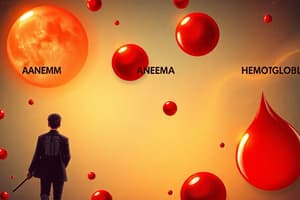Podcast
Questions and Answers
What is the primary physiological role of erythropoietin in the body?
What is the primary physiological role of erythropoietin in the body?
- Stimulates red blood cell production (correct)
- Increases platelet count
- Promotes white blood cell maturation
- Regulates iron metabolism
Which nutritional deficiency is commonly linked to the development of anemia?
Which nutritional deficiency is commonly linked to the development of anemia?
- Calcium
- Vitamin C
- Iron (correct)
- Vitamin D
Which of the following symptoms is NOT typically associated with anemia?
Which of the following symptoms is NOT typically associated with anemia?
- Skin rash (correct)
- Fatigue
- Tachycardia
- Dizziness
What might be a primary cause of macrocytic anemia?
What might be a primary cause of macrocytic anemia?
Which intervention is appropriate for managing a patient with anemia?
Which intervention is appropriate for managing a patient with anemia?
In which situation may hypoproliferative anemia occur?
In which situation may hypoproliferative anemia occur?
What is a common clinical manifestation of anemia that affects oxygen delivery?
What is a common clinical manifestation of anemia that affects oxygen delivery?
Which food is considered high in iron for vegetarians?
Which food is considered high in iron for vegetarians?
What is the primary genetic defect in sickle cell anemia?
What is the primary genetic defect in sickle cell anemia?
Which of the following is NOT a contributing factor that can precipitate a sickle cell crisis?
Which of the following is NOT a contributing factor that can precipitate a sickle cell crisis?
What percentage of hemoglobin S is typically seen in someone with sickle cell disease?
What percentage of hemoglobin S is typically seen in someone with sickle cell disease?
Which nursing intervention is essential for managing a client with sickle cell anemia during a crisis?
Which nursing intervention is essential for managing a client with sickle cell anemia during a crisis?
Which symptom is commonly associated with sickle cell anemia?
Which symptom is commonly associated with sickle cell anemia?
What is a common cause of aplastic anemia?
What is a common cause of aplastic anemia?
Which symptom is most closely associated with thrombocytopenia in aplastic anemia?
Which symptom is most closely associated with thrombocytopenia in aplastic anemia?
What is the primary purpose of performing a bone marrow aspiration or biopsy?
What is the primary purpose of performing a bone marrow aspiration or biopsy?
Which nursing intervention is essential for a patient with aplastic anemia?
Which nursing intervention is essential for a patient with aplastic anemia?
What are common complications of bone marrow transplantation?
What are common complications of bone marrow transplantation?
What type of therapy is commonly used to treat aplastic anemia?
What type of therapy is commonly used to treat aplastic anemia?
What is a sign of graft-versus-host disease (GVHD)?
What is a sign of graft-versus-host disease (GVHD)?
What precaution should be taken concerning visitors for a patient with neutropenia?
What precaution should be taken concerning visitors for a patient with neutropenia?
Which of the following is a potential long-term complication of bone marrow transplantation?
Which of the following is a potential long-term complication of bone marrow transplantation?
How does hematopoietic stem cell transplantation (HSCT) help patients with damaged bone marrow?
How does hematopoietic stem cell transplantation (HSCT) help patients with damaged bone marrow?
Which of the following is a contributing factor to folic acid deficiency anemia?
Which of the following is a contributing factor to folic acid deficiency anemia?
What differentiates folic acid deficiency anemia from vitamin B12 deficiency?
What differentiates folic acid deficiency anemia from vitamin B12 deficiency?
Which food is NOT a good dietary source of folic acid?
Which food is NOT a good dietary source of folic acid?
Which type of anemia occurs due to the inability of the bone marrow to increase red blood cell production?
Which type of anemia occurs due to the inability of the bone marrow to increase red blood cell production?
What is a potential risk associated with erythropoiesis stimulation treatment?
What is a potential risk associated with erythropoiesis stimulation treatment?
What is a common side effect of folic acid supplementation?
What is a common side effect of folic acid supplementation?
Which of the following is a manifestation of hemolytic and aplastic anemia?
Which of the following is a manifestation of hemolytic and aplastic anemia?
What is the most common type of anemia related to nutritional deficiency?
What is the most common type of anemia related to nutritional deficiency?
Which nursing intervention is NOT typically employed for clients with hemolytic or aplastic anemia?
Which nursing intervention is NOT typically employed for clients with hemolytic or aplastic anemia?
Which of the following best describes a manifestation of iron deficiency anemia?
Which of the following best describes a manifestation of iron deficiency anemia?
Which nursing intervention is appropriate for managing a client with iron deficiency anemia?
Which nursing intervention is appropriate for managing a client with iron deficiency anemia?
Which condition can lead to malabsorption causing folic acid deficiency anemia?
Which condition can lead to malabsorption causing folic acid deficiency anemia?
What should a nurse advise a client regarding ferrous sulfate?
What should a nurse advise a client regarding ferrous sulfate?
What is a common drug that could contribute to folic acid deficiency anemia?
What is a common drug that could contribute to folic acid deficiency anemia?
Which of the following is NOT a characteristic of hemolytic anemia?
Which of the following is NOT a characteristic of hemolytic anemia?
In which group of individuals is iron deficiency anemia most commonly seen?
In which group of individuals is iron deficiency anemia most commonly seen?
What should be avoided when administering erythropoiesis stimulating agents intravenously?
What should be avoided when administering erythropoiesis stimulating agents intravenously?
What is a critical side effect of erythropoiesis stimulating agents that patients should be monitored for?
What is a critical side effect of erythropoiesis stimulating agents that patients should be monitored for?
In regards to dietary recommendations for improving iron absorption, which food type is beneficial?
In regards to dietary recommendations for improving iron absorption, which food type is beneficial?
What could indicate chronic blood loss contributing to iron deficiency anemia?
What could indicate chronic blood loss contributing to iron deficiency anemia?
Flashcards are hidden until you start studying
Study Notes
Student Learning Outcomes
- Differentiate between hypoproliferative and hemolytic anemias, including physiological mechanisms and clinical manifestations.
- Understand neutropenia and lymphopenia processes, focusing on medical and nursing management.
- Utilize the nursing process for patient care in conditions like sickle cell disease and thalassemia.
Anemia Overview
- Characterized by a deficiency of red blood cells (RBCs), leading to decreased oxygen delivery to tissues.
- Identified by decreased RBC count, hemoglobin (Hgb), or hematocrit (Hct) levels.
Contributing Factors to Anemia
- Acute/chronic blood loss, such as gastrointestinal bleeding.
- Increased RBC destruction due to conditions like spleen disease.
- Impaired bone marrow function from chemotherapy or diseases like mononucleosis.
- Decreased erythropoietin production associated with renal failure.
- Nutritional deficiencies, particularly iron, vitamin B12, folic acid, and intrinsic factor.
Clinical Manifestations of Anemia
- Signs include fatigue, weakness, dizziness, headache, and pallor.
- Cardiovascular symptoms like tachycardia, murmurs, and orthostatic hypotension.
- Respiratory symptoms, including shortness of breath and decreased oxygen saturation.
Nursing Interventions for Anemia
- Monitor laboratory values (RBC, Hgb, Hct).
- Encourage activity within tolerance and provide frequent rest.
- Maintain skin integrity and prevent breakdown.
- Administer oxygen therapy as needed and provide prescribed blood products.
- Suggest iron-rich diets including meats, legumes, and fortified cereals.
Iron Sources for Vegans/Vegetarians
- Plant-based options, such as tofu, legumes (lentils, beans), wholegrain cereals, and green vegetables.
- Nuts, seeds, dried fruits, and eggs are valuable sources.
Types of Anemia - Renal Disease
- Etiology includes renal failure leading to insufficient erythropoietin.
- Epoetin injection (synthetic erythropoietin) can be prescribed to stimulate RBC production.
Epoetin Alfa (Epogen/Procrit)
- A synthetic erythropoietin produced via recombinant DNA technology.
- Nursing considerations: Administer subcutaneously without shaking the vial and avoid certain diluents.
- Monitor for potential adverse events: heart attack, stroke, heart failure, and blood clots.
Iron Deficiency Anemia
- Arises from low iron levels; iron stores deplete before hemoglobin.
- Frequently seen in infants, older adults, and women due to menstruation or pregnancy.
Aplastic Anemia
- Results from bone marrow suppression leading to low levels of RBCs, WBCs, and platelets.
- Associated with medications, viral infections, toxins, and radiation exposure.
Aplastic Anemia Manifestations and Nursing Interventions
- Patients may exhibit hypoxia, fatigue, pallor, increased infection risk, and bleeding tendencies.
- Nursing actions include lab monitoring, protective isolation, and preparing for bone marrow biopsy.
Bone Marrow Aspirations/Biopsy
- Conducted to assess the functionality of bone marrow and blood cell production.
Graft-versus-Host Disease (GVHD)
- Can occur after allogeneic transplants when donor cells attack the recipient's body.
- Symptoms may include mouth ulcers and abdominal pain; treatment involves immunosuppressants.
Hemolytic and Aplastic Anemia
- These anemias occur when bone marrow cannot compensate for premature RBC destruction.
- Common causes include trauma, infections, and transfusion reactions.
Sickle Cell Anemia
- A genetic condition, common among African American and Mediterranean populations, where Hgb assumes a sickle shape.
- Contributing factors for crisis include stress, dehydration, high altitudes, and infections.
Nursing Interventions for Sickle Cell Anemia
- Promote hydration and oxygen therapy.
- Administer medications for pain management, and advise clients to avoid triggers like high altitudes and extremes in temperature.
Studying That Suits You
Use AI to generate personalized quizzes and flashcards to suit your learning preferences.



